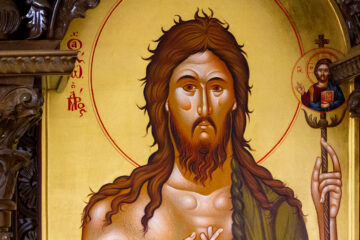Sister Parakliti, Holy Skete of Saint Mary Magdalene, in Liti
Once again we’ve been given the opportunity to devote a little time to the study of Christ’s Nativity in our life, as we approach Christmas, the great feast of the Lord. We’re given the opportunity to look at how we experience the personal advent of Christ, in our homes, in our monasteries, and wherever else we may be, but particularly in our soul.
There are so many aspects of Christ’s incarnation that deserve comment and study. For example, we might look carefully at the icon of the Nativity where we will see a number of people and a variety of attitudes. And just as, in order to help a child to understand its own nativity we might call on it to take part in the icon by putting itself in the place of one of the characters, so we can do the same.
In our Skete, we decided to imitate the magi this year, the wise men from the East.
On 15 November we begin the fast. In his small and deeply spiritual book Christ is born by Fr. Lev Gillet, the author, invites us to say, as a beautiful preparatory prayer: ‘Come, Lord Jesus’. Saying this prayer and, at the same time, looking at the magi in the icon, we can think about what a journey they made to meet the divine infant, to venerate him and offer him their gifts.
The decision to make the journey would have been personal to each of them, but would also have been by common consent. It began with knowledge and was reinforced with courage from an experiential belief that there was a personal message behind the miraculous event of the wondrous star. Not content with observation, they were also moved to action.
During this period, let us study insofar as we can, and may the fast be a kind of leaven for the whole of the time leading up to Christmas day, so that the dough of our altar bread may rise with spiritual experiences along with our flour. Knowledge will bring us to self-awareness and that, in turn, to knowledge of God. This encounter will give us an outlook and way of life with which we can acquire experiential faith; we will also understand the personal message of Christ’s Nativity in our life. The tidings of salvation in Christ’s Nativity are a message offered by God only if we decide, with the same wisdom as the wise men from the East, to leave our home environment and travel to the place of the divine infant. The magi studied and had knowledge, but then something touched their personal, inner world which made it impossible to remain in a state of indifference after the revelation they’d experienced. In their discussions regarding the matter of the star, each took heart from the others and they decided together to make the journey.
In our homes and wherever each of us lives, let us ask ourselves what kind of knowledge touches us. How decisive is the faith we live? What courage do we give to others, to our neighbor? The journey we’re talking about requires unity, spirit, determination and heart. Or, in other words, a heart and spirit where a genuine, experiential, true faith invokes the Holy Spirit, Who unites. Of what value is knowledge and faith without unity and without decisions made in common? How can any family function without common decision-making. Is it, perhaps, not a family?
Nowadays in particular, we’re living in a time full of divisions. How are we to travel together to Bethlehem to present our gifts? For a start, we don’t know if our divisions will even allow the star to be revealed to us.
What can we take from these three points? ‘Come, Lord Jesus’ to give us knowledge, experiential faith and courage: to enable us to see the star all together and so that we can each become a star for others, a real star guiding our brothers and sisters, our neighbor, to the manger in Bethlehem; to give comfort to one another in our isolation because today the Savior is born and therefore we are by no means alone, since the Savior embraces and saves us, warms and welcomes every stranger, everyone in sorrow or distress; to show each other, through our love, the light of the manger so that we can all take strength and warm companionship from the divine infant; to learn to watch out for each other regarding our problems, not to be blind towards others, as if we didn’t see their pain and didn’t hear their suffering; to show understanding to each other and a simple, kind, humane acceptance, since we’re all on the same journey through life. We’re all in transit here and let’s not forget it.
Source: pemptousia.com



0 Comments